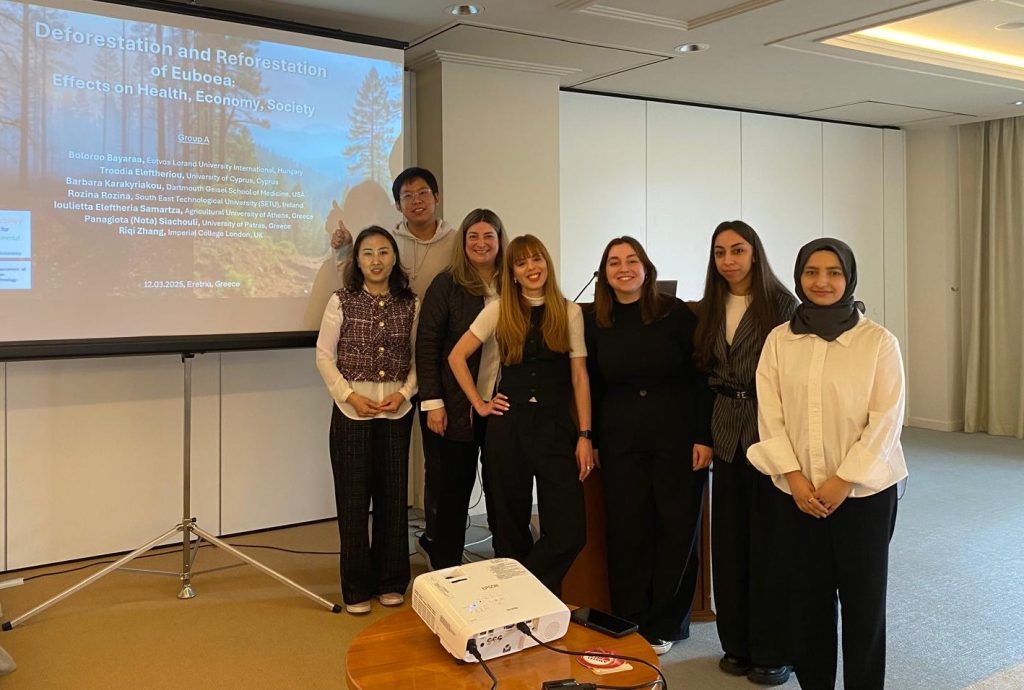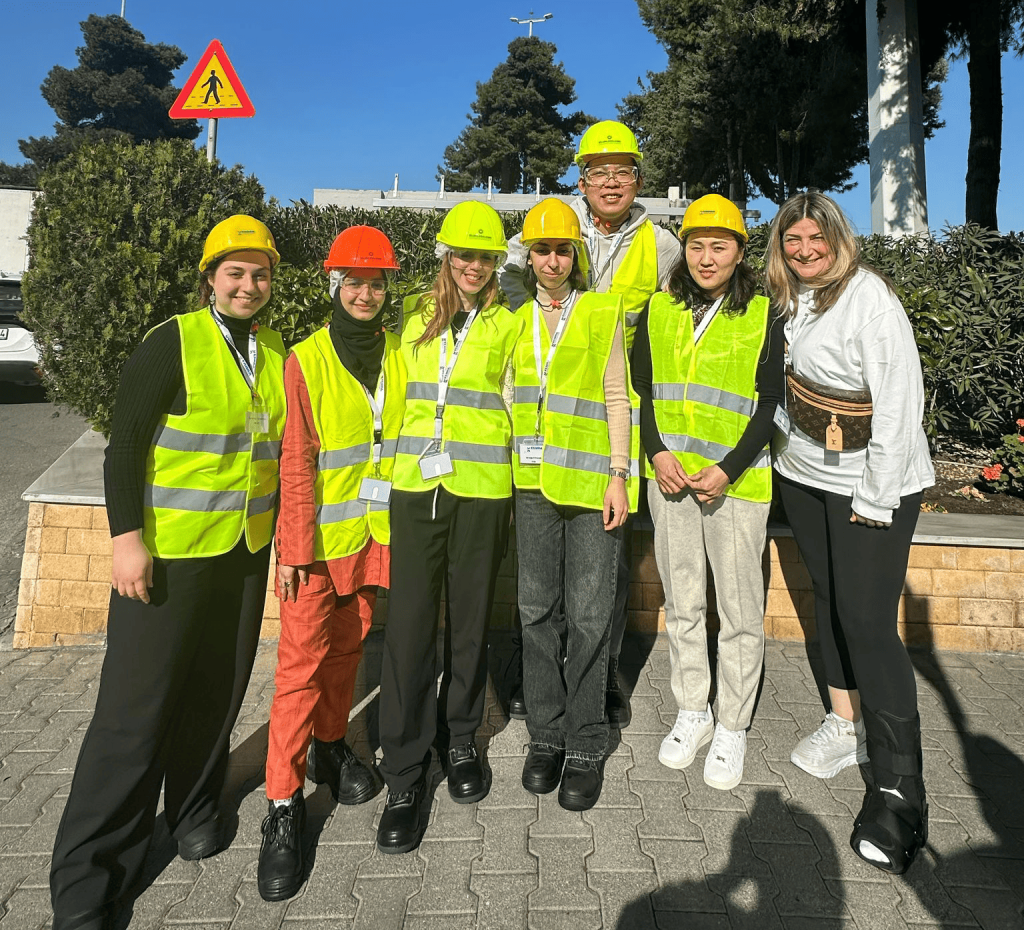 By Riqi Zhang, PhD Candidate at the Centre for Environmental Policy, Imperial College London
By Riqi Zhang, PhD Candidate at the Centre for Environmental Policy, Imperial College London
In recent years, wildfires have become a recurring tragedy on the Greek island of Euboea. Some of the worst incidents occurred in 2007, 2021, and most recently in 2024, each leaving behind scorched earth, displaced communities, and deep environmental and social wounds. Euboea—Greece’s second-largest island—has become a stark symbol of how climate change, land management challenges, and socio-economic vulnerability collide.
In March 2025, I travelled to Greece to participate in the Interdisciplinary School for Environmental Crisis (ISEC)-A Fully Funded Opportunity for Students. As part of a multidisciplinary team of students, I worked on a project titled Deforestation and Reforestation of Euboea: Effects on Health, Economy, Society. We sought to understand not just the environmental destruction caused by recurrent wildfires, but also their lasting impact on community wellbeing—and to explore how reforestation, if done right, can help communities heal.
From Smoke to Struggle: Why It Matters
Forests are more than green landscapes—they are living infrastructure, regulating climate, filtering air, protecting biodiversity, and supporting livelihoods. When they burn, the consequences ripple through every layer of society.
In Euboea, years of recurring wildfires have exacerbated public health problems, with respiratory issues from smoke exposure, heat-related illnesses, and mental health challenges such as anxiety and depression becoming common. Many residents described waking up to skies darkened by smoke, unable to breathe properly, or fearful of the next evacuation order.
The economic toll has also been staggering. Once known for its olive groves, pine honey, and eco-tourism, Euboea now faces agricultural collapse, dwindling tourism, and a sense of economic insecurity that stretches across generations. The fires have not only destroyed land and infrastructure—they’ve burned away confidence in the future.
Culturally, the damage is harder to quantify but just as deep. Local festivals, farming traditions, and forest-based rituals have been disrupted, and interviews revealed a growing disconnect between younger generations and the land that once sustained their communities.
A Journey of Discovery
My team at ISEC included students from diverse academic backgrounds—medicine, engineering, and environmental science—and from different countries and degree levels, including undergraduates, master’s students, and PhD researchers. What united us was a shared recognition: environmental crises are human crises.

One moment that struck me was speaking to a local beekeeper whose hives had been lost in the 2021 fires and whose new ones were again destroyed in 2024. “It’s not just the bees,” he told us. “It’s the plants, the air, the rhythm of life. Everything’s broken.” That moment helped shift our focus. This wasn’t just about ecology. This was about memory, identity, and belonging.
Through site visits, local meetings, and collaborative fieldwork, we began to see how reforestation could not only restore ecosystems, but also rebuild social trust, provide meaningful work, and heal emotional wounds—if approached inclusively.

Breaking Down the Process
To make sense of this complex issue, we examined the impacts of Euboea’s recurring wildfires through three lenses: health, economy, and society.
- Health: We reviewed scientific literature on wildfire exposure and analysed how repeated fire events have increased rates of respiratory illness, heatstroke, and psychological stress—especially among children and the elderly.
- Economy: Our team collected data on agricultural yields, government compensation schemes, and local tourism. Fires didn’t just affect immediate income—they also reduced long-term economic potential and investment interest.
- Society: Using interviews and policy reviews, we examined how wildfires eroded trust in public institutions, altered patterns of land ownership and use, and triggered rural depopulation as young people left in search of safer futures.
What We Found
One of our key findings was that community-led reforestation projects—those rooted in local ecological knowledge and supported by public engagement—achieved far better outcomes than top-down interventions. Programs that planted native species, involved local schools and youth groups, and offered fire prevention training helped rebuild both forests and relationships.
We also found that unaddressed trauma from repeated disasters can undermine recovery. Teachers spoke of students suffering from eco-anxiety; residents mentioned not sleeping during fire season, constantly scanning the hills for smoke. A lack of long-term psychological support and inconsistent recovery funding further deepened these challenges.
Rebuilding Beyond the Trees
Our project concluded with a set of policy recommendations grounded in both data and empathy:
- Invest in public health systems that monitor and treat long-term effects of wildfire exposure, particularly respiratory illness and mental health conditions.
- Empower community-led reforestation by funding local cooperatives, promoting native species, and integrating reforestation with sustainable agriculture.
- Develop economic strategies to diversify income beyond fire-prone crops and tourism, such as introducing climate-resilient farming or renewable energy cooperatives.
- Enhance environmental education in schools to help young people process trauma, connect with nature, and take part in stewardship activities.
A Global Warning
Euboea’s story is a warning for all of us. As the planet warms, wildfires will become more frequent and more destructive—from California to Australia, from Portugal to China. And with each fire, it’s not just the landscape that burns—it’s people’s lives, health, and futures.
The lesson from Euboea is clear: climate recovery must be human-centred. Rebuilding ecosystems must go hand in hand with supporting communities. Without that balance, even the greenest forests may not truly be resilient.
What Would You Do?
If your home were threatened by wildfires every few years, how would you adapt?
What would resilience look like—not just in nature, but in your neighbourhood?
More Information about ISEC, please click https://www.aristeia.us/

